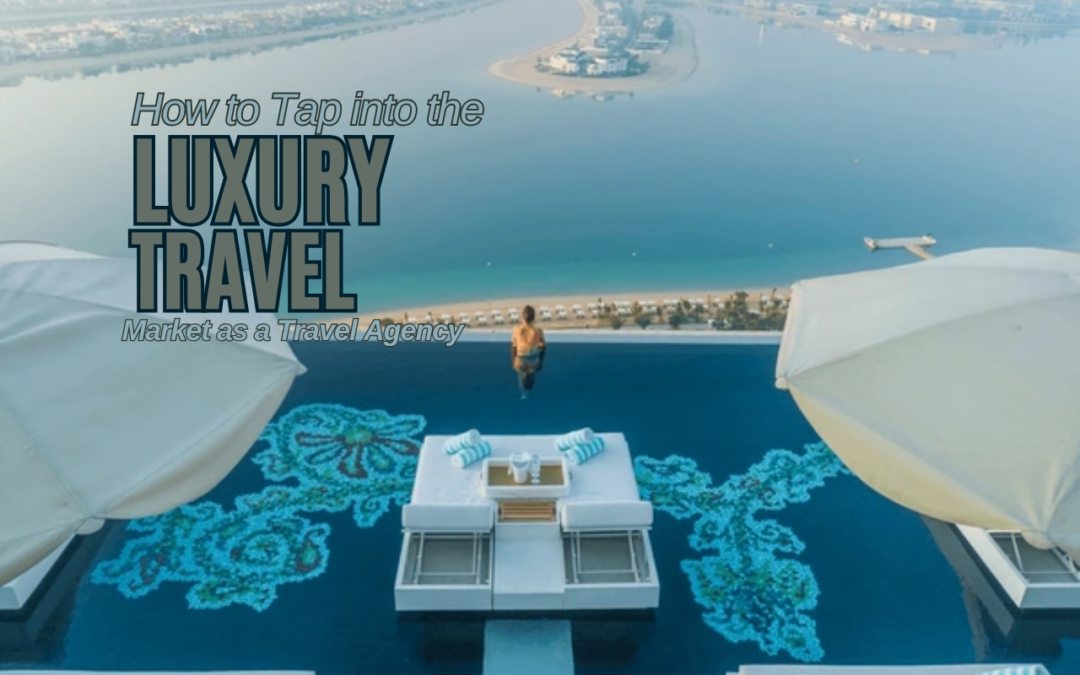The luxury travel market is booming, with wealthy clients seeking personalized and exclusive experiences that go beyond the typical vacation. According to a 2023 report by Allied Market Research, the global luxury travel market is projected to reach $1,574.6 billion by 2031, growing at a compound annual growth rate (CAGR) of 8.3% from 2022 to 2031. As a travel agency, this market offers immense opportunities for growth if you can provide the experiences affluent clients desire. Here’s a detailed guide to help you break into this profitable niche.
1. Understand the Needs of Luxury Travelers
Luxury travelers expect more than just premium accommodations or first-class flights. They want personalization, exclusivity, and unforgettable experiences. A survey by Amadeus revealed that 72% of luxury travelers prioritize tailored itineraries that reflect their personal preferences.
For example, a luxury client may prefer a private guided tour of Italy’s hidden gems over a standard sightseeing package. The key is to listen to your clients and design trips that align with their unique tastes.
2. Partner with Premium Suppliers
Collaboration with top-tier suppliers is essential for delivering high-quality experiences. Luxury clients expect the best, whether it’s a suite at a world-class hotel, a private jet, or access to an exclusive event. Partnering with renowned brands like Four Seasons, Aman Resorts, or private yacht companies can help your agency provide the level of service these travelers demand.
Membership in luxury travel networks like Virtuoso or Traveller Made can also give you access to exclusive perks, such as upgrades and VIP services. These relationships ensure that your clients receive top-notch treatment.
3. Focus on Emerging Trends
Luxury travel trends are constantly evolving. Staying ahead of these trends can set your agency apart. Some key trends include:
- Experiential Travel: Travelers are looking for authentic, immersive experiences. Think cooking classes with renowned chefs or cultural exchanges in remote villages.
- Wellness Tourism: The wellness tourism market, valued at $817 billion in 2022, is growing rapidly. Luxury spa retreats, yoga getaways, and detox programs are in high demand.
- Sustainable Travel: A Booking.com study found that 81% of travelers want sustainable options, and luxury clients are willing to pay a premium for eco-friendly experiences.
Offering packages that cater to these trends can help attract the modern luxury traveler.
4. Use Technology to Enhance Service
Sophisticated technology can elevate the customer experience and streamline your operations. A survey by Skift revealed that 55% of luxury travelers expect real-time updates during their trips. Tools like mobile apps that provide instant itinerary updates or AI systems that recommend activities based on preferences can make a huge difference.
For example, you could use an app that allows clients to contact their travel consultant 24/7 or receive personalized dining recommendations while on vacation. These features ensure seamless service and build trust with your clients.
5. Create Unique and Exclusive Offerings
Exclusivity is a cornerstone of luxury travel. Luxury clients want experiences that are one-of-a-kind, such as:
- Private safaris in Africa with luxury camping setups.
- Exclusive access to cultural events, like a private opera performance.
- Personalized wine-tasting tours at boutique vineyards.
The 2023 Virtuoso Luxe Report showed that travelers are increasingly drawn to experiences over material goods, making this a perfect time to design truly unique packages.
6. Build a Strong Brand Presence
A strong brand reputation is critical in the luxury market. High-end clients often choose agencies they perceive as trustworthy and established. Your website, social media profiles, and promotional materials should exude sophistication and highlight your expertise.
- Use professional imagery of luxury destinations.
- Share client testimonials or success stories.
- Highlight any awards, partnerships, or memberships in luxury travel networks.
For example, sharing a story about how you arranged a last-minute helicopter transfer for a client can showcase your commitment to exceptional service.
7. Market to the Right Audience
Targeting the right audience is key to success in the luxury market. According to Statista, 41% of global luxury travel spending comes from Millennials and Gen Z. These groups value sustainability, wellness, and experiential travel, making them an important demographic.
Strategies to reach this audience include:
- Social Media: Use Instagram and Pinterest to share visually appealing content showcasing luxury destinations and experiences.
- Influencer Marketing: Collaborate with luxury travel influencers to promote your services.
- Search Engine Optimization (SEO): Optimize your website with high-ranking keywords like “luxury safari tours” or “private yacht charters.”
8. Offer Concierge-Level Service
Luxury clients expect top-tier service that goes beyond booking trips. They want a concierge-style experience where every detail is taken care of. This includes handling special requests like securing last-minute tickets to exclusive events or arranging for private transportation.
Offering 24/7 support during their trip shows that you are dedicated to their satisfaction, which builds loyalty and encourages referrals.
9. Emphasize Sustainability
Sustainability is no longer optional—it’s a priority for many luxury travelers. A Virtuoso survey found that 70% of luxury travelers want sustainable travel options, and they are willing to pay more for eco-friendly services.
Incorporate sustainability into your offerings by:
- Partnering with eco-luxury hotels.
- Offering carbon-neutral travel packages.
- Highlighting community-based tourism initiatives that give back to local economies.
10. Stay Ahead of the Competition
The luxury travel market is competitive, and staying informed about the latest trends can give you an edge. For example, destinations like Bhutan, Antarctica, and Patagonia are becoming increasingly popular among affluent travelers.
Attend luxury travel expos, join industry forums, and follow reports like the Virtuoso Luxe Report to keep your agency ahead of the curve.
Conclusion
Tapping into the luxury travel market requires more than just offering expensive vacations. It’s about delivering exceptional service, unique experiences, and personalized attention to meet the high expectations of affluent clients. With the market poised to grow significantly in the coming years, your agency has an incredible opportunity to attract wealthy travelers by staying ahead of trends, building strong partnerships, and focusing on what truly matters to this exclusive audience.
By following these strategies, you can position your agency as a leader in the luxury travel space, ensuring long-term success in this lucrative market.












